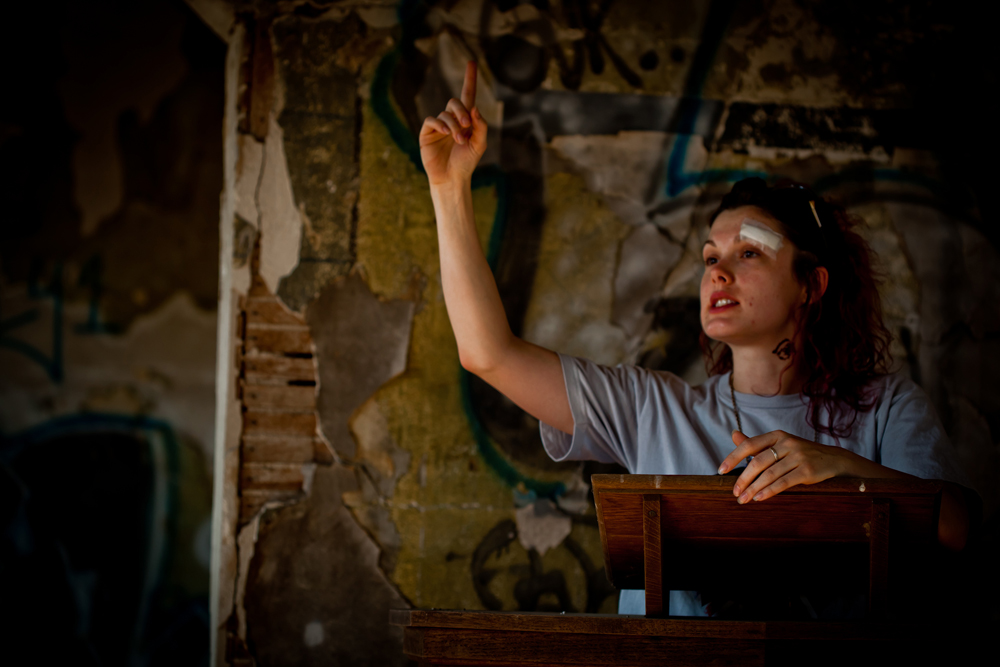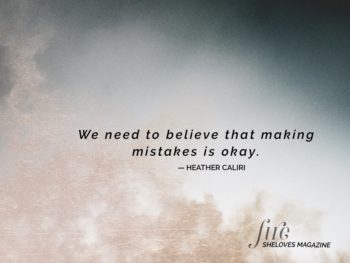“Can you tell me what this verse means?” Ellen asked.
She glanced at her Bible and read, “Women should remain silent in the churches. They are not allowed to speak, but must be in submission, as the law says.”
She looked up at the pulpit, where our pastor, a prematurely gray-haired man, stood during the congregational meeting Q and A.
I was sandwiched between my parents on a honey-colored pew. Even at fourteen, I struggled to see past the shoulders in front of me.
But I could see Ellen. She was tall, nearly six feet.
I could tell by the way she read the verses—no, by her simply asking the question—that she wouldn’t stay silent, no matter what the Bible said.
There was an anxious pause for a moment. Or, at least, I was anxious.
Because knowing that the Bible said that about women—about me—gave me a stomachache.
We’d only started going to church the year before. Our new church—Presbyterian, largish, and friendly—had become home to me.
I’d converted the year before that—thanks to my sister’s influence. Not long afterward, we started going to church as a family.
As a new Christian, I hadn’t read the Bible yet. I was thirteen, and I wasn’t even clear on what the Bible was. I’d assumed it was just a story, like the children’s bibles I’d seen, only with fancier words.
I also assumed women fully participating in church was normal. At our new church, women preached. They were pastors, deacons, and elders.
Discovering this was debatable felt like freefalling.
I sat up as straight as possible, so I could look at the pastor’s face. Was he shocked at the Bible’s chutzpah? Or Ellen’s?
“You don’t beat around the bush, do you, Ellen?” he said with a warm smile.
The congregation tittered. Everyone else already knew these verses, I realized. And no one seemed that offended by Ellen’s question.
Later, I’d learn that our church was PCUSA, a denomination that fully affirms women in leadership. After our senior pastor left, a woman replaced him. Women serve in childcare, sure, but they also serve communion.
Before Ellen opened her mouth, none of this had been remarkable to me. But now, with a pit in my stomach, I realized that all these women in leadership needed to be remarked upon.
I wish I could remember exactly how my pastor answered Ellen’s question. Perhaps he mentioned cultural context, hermeneutics, or the fuller picture of Paul’s gender-diverse ministry.
He solved the riddle of Ellen’s question to everyone’s satisfaction after only a few minutes.
But I wasn’t convinced.
I didn’t know enough about theology to be confident I could believe his explanation.
Why?
My sister had converted me, and fundamentalists had converted her.
What I knew of her theology was what it didn’t allow: evolution, rote prayers (like we said in my church), secular music, liberal interpretations of God’s Word, etc.
I trusted my sister. I wanted to be like her. What would she think of Ellen’s question? Would she look down on me if I asked questions too?
Asking questions didn’t seem ladylike, did it?
Ellen didn’t fit what I thought of as ladylike at the time, either. She was so tall. She didn’t wear much makeup; her voice had a timbre. She wasn’t “mannish,” but neither was she dainty.
I was small. I was cute. I did what I was told. I did not make a fuss.
Was that why Ellen spoke up? Because she wasn’t quite the type of women who would stay silent? Was she maybe less of a woman because of her brashness?
I didn’t know.
Oddly, I danced around what I thought about Ellen and her womanliness until I did that most stereotypical of female acts: giving birth.
In labor, I discovered my body’s way of handling pain: using my voice.
I moaned. I sang. I cried aloud. I matched the rise and fall of each contraction with a deep groan unfamiliar to me. I vocalized my way through my first daughter’s labor, and then my second’s, through complications, through stitches and recovery.
The habit stuck. Any time I’m in physical pain, I start using my voice.
It wasn’t just labor that taught me about the womanly art of speaking up. Early motherhood did too—the mixed blessing of nursing, night waking, diapers, and staying at home. The tidal wave of need loosed my tongue to ask for help.
It occurs to me that Ellen asked for help, too. Asked to understand, asked for reassurance, asked for everyone to feel the pain of what the seemingly plain language of God said about women.
It was in motherhood that I realized that my own questions about women, God, and the Bible were fluttering against my throat. I realized, nursing one night, that if I didn’t ask them soon, I might stop speaking to God altogether.
After Ellen, and labor, and motherhood, I realized that asking my anguished questions out loud falls squarely in the realm of “women’s work.” Women have always cried aloud when their labor is fierce. We have always used our voices to get through to the other side of pain and hardship.
I have realized that no matter what room I’m in—hostile, indifferent, accepting, or confused—I must remark upon the audacity of women speaking up.
I must stand up, straighten my back, and ask the frightening questions that struggle to be born.
Originally published on CBE International’s Newsletter
Image credit: David Sorich















 The Night I Almost Stopped Being a Christian: for The Mudroom
The Night I Almost Stopped Being a Christian: for The Mudroom
Thank you for introducing me to CBE! I didn’t realize there’s an organization out there like this and this gives me hope. 🙂
Yay! My pleasure–they do so much good work 🙂